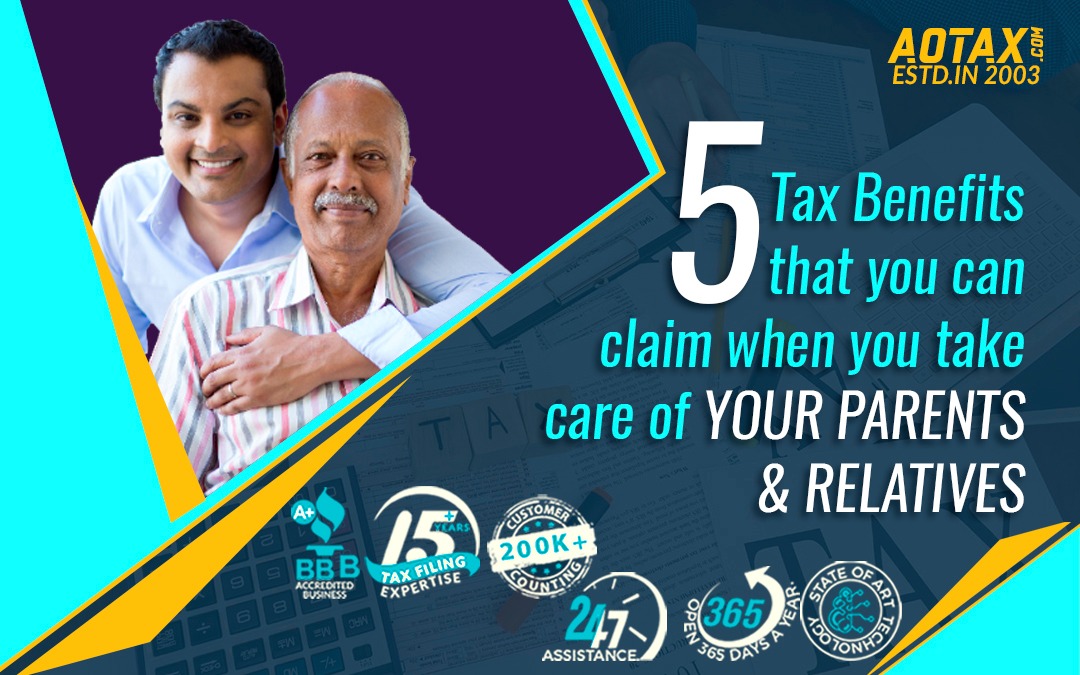
5 Tax Benefits that you can claim when you take care of YOUR PARENTS & RELATIVES
5 Tax Benefits that you can claim when you take care of YOUR PARENTS & RELATIVES?
Tax Benefits ,A considerable amount of your money can get into medical related expenses when it comes to taking care of parents or relatives. Here are the five Tax Benefits
According to Caring.com, a company that specialized in Bankrate, about 40% of caregivers spend about $5,000 a year on caregiving. Similarly, about 25% of people spend more than $10,000 per year on caregiving.
Though it is not the primary concern paying for caregiving expenses can help you avail some tax benefits. One of the key points that you need to be aware of is that your elderly parents are declared as dependents.
Here are some of the benefits that you can claim if you take care of your dependent parents or relatives.
-
Medical Expenses
Having elderly parents can result in quite a considerable sum of money being spent on medical expenses. You have the option of claiming them as Itemized Deductions in Schedule A of your income tax.
- Itemized Deduction comes in handy if you have exceeded the standard deduction limit.
- The total medical related expenses must be more than 7.5% of your total adjusted gross income for a fiscal year.
- The expenses include hospital care, visit(s) to doctors, cost of prescription drugs and so on.
- January 2019 onwards, you will be able to claim only unreimbursed medical expenses if they exceed 10% of your adjusted gross income.
-
Income Simulation
The IRS has set a few criteria that your parents must meet before you can declare them as dependents on your tax returns. Here are some of them.
- Your parents should not have an income that exceeds the exemption amount for the year in question.
- The IRS decides the exemption amount and the value might change year on year.
- In the event, your parent(s) have income from dividends or interests, a portion of their social security might also be taxable.
- The IRS publication 501 consists of the exemptions for the current year.
-
Providing Support
If you provide support to your parents for at least half of the fiscal year, there are a few tax benefits that you can avail. The following are some factors that you need to consider before determining the support amount.
- You would need to find out a fair market value for the room. If someone were to rent the room out, how much would they pay for it?
- The next step would be to include expenses related to food. One needs to be careful and not include utility bills, medical bills or other general expenses that you incur.
- The amount that you want to claim as support should exceed the income of your parent(s) by a minimum of $1.
- A comparison between the income that they receive, social security or other income and the support that you lend will paint a clearer picture of support requirements.
-
Care Credit
Dependent care is a non-refundable tax credit that you can benefit from. In the event that your parent is a qualifying individual, you can claim for it. Here is all that you need to be aware of.
- Parents who are physically or mentally unable to take care of themselves are qualified individuals.
- You should have an income and certain work-related expenses to show, so as to qualify for the tax credit.
- You should be able to identify your care provider properly.
-
Supporting Siblings
In the event that you support your parents along with siblings, you can claim the amount as well. The only condition being that each sibling must contribute to at least 10% of the total support expenses.
The above tax benefits will aid you in taking care of dependent parents or relatives.




Recent Comments